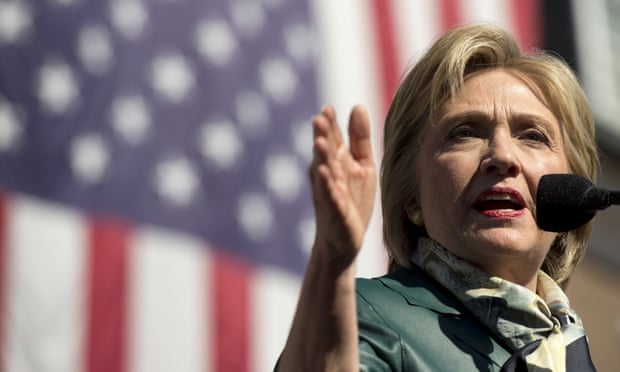Sabrina Siddiqui - Tom McCarthy
''After a month that saw an impressive debate performance and a measured response to aggressive questioning over Benghazi, Howard Dean says the Democratic frontrunner has ‘weathered the worst’ of campaign hurdles.''
When Hillary Clinton took the stage before 3,500 energized supporters in a historic district of northern Virginia on Friday, the scene glowed with the sense of a presidential campaign on an upward trajectory.
The sun shone brightly on an uncharacteristically warm afternoon in late October as Terry McAuliffe, the state’s Democratic governor and a longtime friend of Clinton, fired up the crowd with an impassioned introduction.
McAuliffe was only midway through his remarks when the audience broke into chants of “Hillary, Hillary, Hillary”. Their excitement was compounded when he invoked a marathon hearing a day before, in which the former secretary of state maintained her composure as Republicans grilled her in the most dramatic fashion regarding the September 2012 terrorist attacks in Benghazi, Libya.
“You want to talk about a fighter – how about those 11 hours of testimony yesterday?” McAuliffe said. “I almost want to thank [the Republicans], because you saw in that 11 hours of testimony, this is why she needs to be our commander-in-chief.”
The crowd roared in agreement.
While Clinton has appeared before countless crowds of supporters since launching her second presidential campaign, there was a palpable buoyancy to this audience –the kind of grassroots enthusiasm political observers have wondered if Clinton is capable of generating.
But a lot has changed since the soft launch of her campaign in April, and many believe the month of October has solidified her standing as the presumptive Democratic nominee.
It has been a rollercoaster six months since Clinton declared her candidacy with an upbeat web video, followed by a cross-country trip in a Chevy van nicknamed “Scooby”. Discussions with voters at stops in Iowa were meant to display that for all her celebrity, she remained relatable – comfortable in conversations with everyday Americans, a good listener.
That image was disrupted, however, by frustration among the press over Clinton’s avoidance of questions as she visited key early voting states like Iowa and New Hampshire. The emphasis of early reports was not the substance of Clinton’s dialogue with voters, but rather on when she last fielded a question from a journalist. The Washington Post built a Clinton question clock that ran for most of May without her answering one.
A portrait emerged of a controlled campaign, in which roundtable participants were hand-picked and questions screened. At a July parade in New Hampshire, Clinton aides whipped out a rope and corralled journalists, fueling a sense that the candidate was off-limits.
The email issue, meanwhile, continued to percolate. Clinton’s use of a personal email account and private server while serving as President Obama’s first secretary of state was first reported in early March. Critics voiced alarm that she had handled classified information inappropriately or had sought to avoid the transparency requirements of public service.
Her campaign said she had wanted to avoid the inconvenience of carrying two mobile devices – one work and one personal – and that the government’s email system was so bad that other top officials did not use it, either. Clinton said she had not handled classified information on the account, although that contention was later called into question. Evidence either way has not so far been made public.
A congressional inquiry was launched, but more disturbingly for Clinton supporters, the FBI decided to investigate. The Republicans pounced with selective leaks to the press as part of a broader effort to tie Clinton’s email server to questions surrounding the attacks in Benghazi, in which four Americans, including the ambassador to Libya, were killed.
In September, a Washington Post poll found that support for Clinton among Democratic female voters had slid 29 points in eight weeks.
But as much as the rise of the emails controversy and Clinton’s slide in the polls correlated, the line of causation was much less clear. While the media reported relentlessly on Clinton’s emails, there was little polling to indicate that the issue had gained traction with the public. Clinton’s favorability among Democrats remained at the top of the pack, at nearly 74%, and her lead nationally over the Vermont senator Bernie Sanders dipped only once, briefly, below 20 points.
“She came in as the prohibitive favorite,” said Howard Dean, a former Democratic governor of Vermont and one-time presidential candidate. “And the press hates the prohibitive favorite. But she rallied, and she hung in there … I think she’s earned what she’s got.”
Indeed, the unexpected rise of Sanders in certain early primary states gave way to a new narrative: that Clinton’s second bid for the White House was becoming a redux of 2008, when her campaign was blindsided by a relatively unknown senator named Barack Obama.
Parallels were drawn to the unmistakable energy among grassroots supporters in favor of Sanders, an independent running on an impassioned plea for economic equality. In August, Sanders staged rallies in Los Angeles and Portland, Oregon, that drew overflow crowds of almost 30,000 each – five times the size of the biggest Clinton event at the time.
Campaign finance filings made Sanders’ advantage with the grassroots even more stark. In the third quarter, he raised more than $20m – or 77% of his total – from small donors giving less than $200 apiece. Clinton raised only $5.2m of her $28 million haul from small donors. Sanders passed her in polling in New Hampshire, the state with the first primary voting, and closed the gap in Iowa, the site of the first caucuses.
Next to Sanders was another Democrat causing the Clinton campaign anxiety. For months, Vice-President Joe Biden had seemed unable to decide whether to mount a presidential run. Biden’s indecision directly undercut Clinton, with some donors urging the two-time presidential candidate to once again enter the race.
The competing pressures were enough to push the Clinton campaign in September to change direction, but even the resulting announcement became a moment for mirth. From now on, her campaign said, Clinton would exhibit more spontaneity, empathy and warmth. It sounded like something out of the satirical newspaper The Onion, tweeted former top Obama advisor David Axelrod.
But even as the 24/7 news cycle established an account of a candidate in deep trouble, Clinton’s campaign maintained its confidence.
Although the decisions to come out against the controversial Keystone XL pipeline and Obama’s historic 12-nation Pacific Rim trade pact reflected the tangible impact of the Democratic primary on her campaign, Clinton sustained her focus on the general election.
The campaign steadily rolled out policy proposals – from criminal justice and campaign finance reform to energy policy and financial reform – while contrasting her vision with that of the Republican Party. The choice, she said, was clear: her progressive platform or a decidedly regressive Republican agenda.
It was the very same message Clinton took to the national stage in Las Vegas on 13 October, at the first Democratic presidential debate. Even as she stood next to Sanders for the first time in months, Clinton came off as the more authoritative, agile and at ease contender. To believe the pollsters afterward, it was she who had won.
Clinton also did not shy away from going after Sanders over his failure to back gun control legislation and was, not unexpectedly, the most well-versed candidate on foreign policy. And then there was an exchange with Sanders that became an instant classic in the annals of presidential debates.
“The American public is sick and tired of hearing about your damn emails!” Sanders said.
It was the biggest applause line of the night.
One week later, Biden announced he would not seek the presidency. His speech, delivered from the White House Rose Garden with Obama by his side, appeared to have been written with the opposite intention. There were thinly disguised jabs at both Clinton and Sanders, whom the vice-president implied had unnecessarily distanced themselves from the legacy of the Obama administration.
“Democrats should not only defend this record and protect this record. They should run on the record,” he said.
It seemed as though Biden had envisioned himself in that role, but the support simply wasn’t there as Clinton looked increasingly unstoppable. And despite several moves to the left of Obama, it was not as though Clinton had run away from the administration in which she served.
Much of her stump speech on the campaign trail, in fact, casts the Obama administration’s work as critical progress upon which only another Democratic president can build.
Just a day after Biden’s decision, Clinton was made to revisit her tenure leading the State Department under Obama. In a drafty hearing room on Capitol Hill, Republicans on a select committee established to investigate the Benghazi attacksberated her for 11 hours.
Clinton didn’t give an inch, remaining calm and measured in her responses even as she was interrupted, shouted at and accused of not caring for the four Americans who died at the compound on 11 September 2012.
She had received a major assist from Republicans themselves, when House majority whip Kevin McCarthy earlier bragged about how the committee had driven down her poll numbers.
It was a Kinsley gaffe – a politician’s unintended revealing of an obvious truth, as defined by the journalist Michael Kinsley – if there ever were one. That the committee’s focus was not to probe the attacks in Benghazi, which had already been the subject of eight investigations, but to damage Clinton politically as she sought the nation’s highest office, was suspected by most. Until McCarthy spoke, it had not been so baldly stated.
In the end, Clinton did not simply emerge unscathed. Praise for her performance echoed the reception of her debate outing, to the extent that even conservative commentators seethed about how the Republicans on the panel may as well have giftwrapped and handed Clinton the entire election.
Standing at the packed campaign rally in Virginia a day later, a defiant Clinton announced that her campaign now had more than 500,000 donors.
Her aides quickly followed up with details highlighting the impact of October: 100,000 new donors this month alone and a record hour of online donations as soon as the Benghazi hearing concluded – even though the Clinton campaign did not issue any fundraising calls around the proceedings.
More than half of the donations that poured in on the day of the hearing, the campaign added, were from new donors; 99% of them were smaller donations of $250 or less.
Brian Fallon, a spokesman for the campaign, said the hearing and the debate underscored that even when Republicans and others tried to test her, “Hillary Clinton is battle-ready”.
“She came off as extremely in command, knowledgeable, quite presidential,” he told reporters before the rally on Friday.
“While we think there will continue to be a rhythm to the campaign over time, where there’ll be high moments and other moments that are more challenging, the fundamental truism that we saw in the last couple of weeks is the more that voters get to see her and hear from her in an unfiltered forum, we see that moves people and people respond.”
That was not to say Clinton’s surrogates are not well aware the narrative could change at any moment. But they were confident that Republicans had overplayed their hand and would now struggle to gain the same kind of traction over issues like the email server and Benghazi.
“This all goes in cycles. And there’ll be another cycle of bad press,” said Dean. “But she’s weathered the worst of this.”


No comments:
Post a Comment